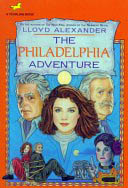 [Here’s the latest in an ongoing series of reviews of all of Lloyd Alexander’s non-Prydain books. To see all posts in this series, click on the “Lloyd Alexander” tag.]
[Here’s the latest in an ongoing series of reviews of all of Lloyd Alexander’s non-Prydain books. To see all posts in this series, click on the “Lloyd Alexander” tag.]
From 1986 to 1990, Lloyd Alexander published five Vesper Holly novels. While he clearly loved writing these slender adventures about an absurdly brilliant teenage polymath from 1870s Philadelphia, the third and fourth books fell back too easily on the formula established in the first, with an infallible heroine battling her nemesis in a world without any true danger. Fortunately, in the fifth book, The Philadelphia Adventure, Alexander tweaks the premise: Instead of sending Vesper and her guardian abroad to unravel the plots of the evil Dr. Helvetius, he sees fit to lure the villain to Vesper’s—and his own—hometown.
“For these past few years, Miss Vesper Holly has adventured in imaginary places that seem real,” Alexander writes in an author’s note. “Now she adventures in a real place that seems imaginary, even fantastic.” With its cutthroat sailors, irritable Quakers, and disgruntled Civil War vets, Philadelphia is a worthy setting for a Vesper Holly adventure, even if Alexander embellishes his beloved city. Recalling his childhood perceptions of the Philadelphia suburbs, he turns Aronimink into an impenetrable wilderness, Kellytown into a pirate haven, and his own Drexel Hill into a jungle:
[By] late afternoon, we plunged into the harsh embrace of the Drexel Hills.
Our majestic Alleghenies may surpass the Drexel Hills in altitude, but not in spitefulness. For that, they can only be compared to the ghastly Haggar Mountains of Jedera. Most of the Haggar is bleakly devoid of life. In the Drexel Hills, there is entirely too much of it, mainly in the form of malicious biting and stinging insects, including an especially savage wood louse, unique to the area, almost as big as my thumbnail. Even the bramble bushes and wild barberry seemed possessed of malevolent lives of their own, plucking at us with their sharp talons. We were in constant danger of twisting our ankles on stones thrusting up like dragon’s teeth. Garter snakes the size of young anacondas slithered across our path…
Alexander’s Philadelphian grotesque, while funny, also strikes a necessary note of tension. When Vesper Holly and Dr. Helvetius finally come to blows, their fistfight on the banks of the Schuylkill recalls Moriarity and Sherlock Holmes—and the adult reader begins to wonder if death, in one of its innumerable forms, looms over this series at last.
Naturally, The Philadelphia Adventure has a wild Vesper Holly plot: President Ulysses S. Grant and Emperor Dom Pedro II of Brazil implore Vesper to ransom two royal Brazilian toddlers while saving the 1876 Philadelphia Centennial Exposition from the sabotage of Dr. Helvetius, who plans to use George Henry Corliss’s steam engine to blow up Grant, his Cabinet, and the Brazilian imperial family so he can install a puppet leader in America and raise a Brazilian-American empire from the chaos. All of this unfolds as a Vesper Holly book must, with demonstrations of language skills, displays of expert horsemanship, affirmation of scientific wisdom, and the musings of an affably fallible narrator, Dr. Brinnie Garrett, who seems surprised when decency wins in the end.
Of course, how a Vesper Holly book ends is less important than the gentle didacticism that drives each adventure to its closing page. The Philadelphia Adventure offers a quick snapshot of the troubled Grant Administration; it brings readers to the 1876 Expo; it shows Brinnie Garrett taking pride in the Etruscan history he never quite finishes, and a scholar nicknamed “The Weed” exploring yoga and Minoan inscriptions; and it introduces readers to Browning’s “How They Brought the Good News From Ghent to Aix,” Whittier’s “Centennial Hymn” (which Brinnie mishears as “bloodcurdling shrieks and dreadful wailing”), and Wagner’s “Grand Centennial March.” Meanwhile, Vesper’s carriage horses are named Horsa and Hengist. At one point, Max Schmidt rows by, straight out of Eakins.
I could gripe that after five books, the Vesper Holly cast, never very substantive, still seems slight, but The Philadelphia Adventure is a lively read, all the more so because it reinvigorates the series; without scolding us to eat our peas, Alexander makes clear that science, literature, history, and music can be sources of pleasure and joy. The romp wrapped around that message lets young readers know that success begins with cultural and scientific knowledge properly applied and buttressed by human decency—a formula Alexander might properly credit to brotherly love.
